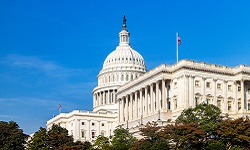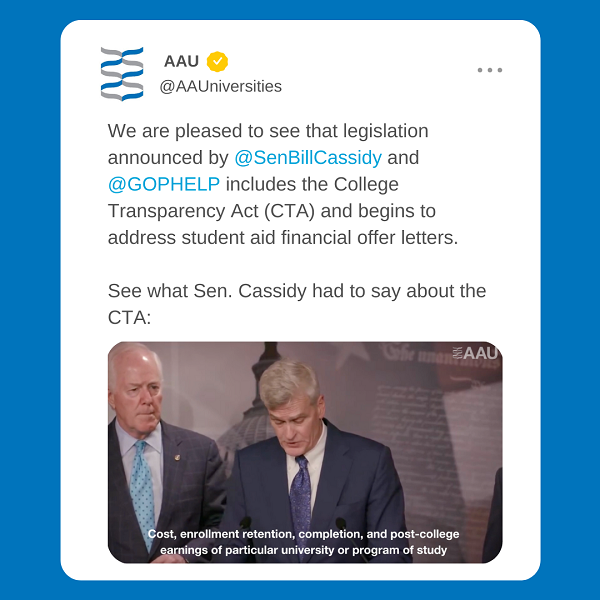 AAU Task Force on Expanding U.S.-India University Partnerships Releases Interim Report
AAU Task Force on Expanding U.S.-India University Partnerships Releases Interim Report
The AAU Task Force on Expanding U.S.-India University Partnerships released its interim report last week, making preliminary recommendations on how the two countries might better partner to expand collaboration between their universities. The report features examples of several ongoing and recently announced partnerships between AAU member universities and leading Indian research universities that demonstrate the value of meaningful research and education collaborations. The release of the interim report coincided with Indian Prime Minister Narendra Modi’s state visit to Washington last week.
The report makes nine recommendations, including that the two countries establish joint “Indo-U.S. Global Challenge Institutes” to address societal and scientific grand challenges. The White House noted that both President Biden and Prime Minister Modi “welcomed” the report and its recommendation to establish the institutes “to spark deeper research partnerships and people-to-people exchanges between a range of diverse institutions in the U.S. and India in semiconductors, sustainable agriculture, clean energy, health and pandemic preparedness, and emerging technologies.”
The report further recommends that the two countries scale up student and faculty research collaboration and exchanges, share physical research infrastructure, and expand opportunities for internships and apprenticeships. The report also urges the United States to surge staffing resources at its consulates in India to process visa applications from Indian students, scientists, and exchange visitors more quickly.
“This interim report is a key first step in better leveraging the immense potential and resources of India and the United States to further scientific advancement, economic growth, and national security for both countries,” said AAU President Barbara R. Snyder in a press release. “We invite policymakers and our Indian colleagues to review its recommendations and provide us with any feedback that they think could improve the final report, which we plan to release later this year.”
AAU, Associations Comment on Department of Education’s Proposed Gainful Employment and Financial Transparency Rules
AAU submitted a comment letter to Secretary of Education Miguel Cardona last week in response to the Department of Education’s proposed rules on “gainful employment” and financial transparency. Among other things, the rules would require certificate programs at all institutions of higher learning and degree programs at private for-profit colleges to demonstrate, using a debt-to-earnings ratio, that their graduates earn enough to afford their student loan repayments and earn more than high school graduates in their state without any postsecondary education. Programs that fail to meet established metrics could lose access to federal financial aid programs.
The transparency portion of the proposed rules would, according to a press release from the department, require institutions to make available detailed and consistent information to students and families concerning “what they are likely to pay for postsecondary programs, how much they are likely to earn after completing a credential, and whether they are selecting a program that is likely to leave them with unaffordable debt.”
In its comment letter, AAU agreed with the department that “more transparency on college costs and success rates is vital to ensuring that families and students have the most accurate information to make well-informed choices.” The letter expressed reservations, however, about the burden the requirements would place on institutions to accurately produce the data. AAU also expressed concerns regarding “the use of debt-to-earnings and earnings premiums metrics for showing the true quality and value of a program.” For example, the letter noted, “many programs in the arts and humanities, social work, counseling, and public health may not be accurately represented for their long-term value.”
AAU also joined the American Council on Education and 46 other higher education associations in submitting additional comments on the proposed rules. The ACE-led letter offered support for some items in the NPRM as well as comments on measures that could be improved. For instance, the joint letter expressed reservations similar to those in AAU’s solo letter about the use of debt-to-earnings ratio and earnings premium rates to demonstrate program quality. It further questioned the department’s authority to deny federal funding to institutions that fall below proposed gainful employment requirements.
 AAU, Associations Ask the Senate to Confirm Monica Bertagnolli as NIH Director Swiftly
AAU, Associations Ask the Senate to Confirm Monica Bertagnolli as NIH Director Swiftly
AAU joined the American Association for the Advancement of Science and more than 100 other higher education and scientific organizations in sending a letter urging leaders of the Senate and the Senate HELP Committee to swiftly confirm Monica Bertagnolli as the director of the National Institutes of Health.
Bertagnolli is currently the director of the National Cancer Institute and has previously served as the Richard E. Wilson Professor of Surgery at Harvard Medical School and a surgeon at Brigham and Women’s Hospital in Boston. The letter emphasized Bertagnolli’s exceptional qualifications and called her the “ideal candidate” to lead the NIH. “Dr. Bertagnolli will bring the experience and leadership that are necessary to guide the NIH into the future and to accelerate discovery, innovation, and treatments in a new era of research for patients and public health,” the letter noted.
 ICYMI: AAU President Welcomes Nomination of Monica Bertagnolli to Lead the National Institutes of Health
ICYMI: AAU President Welcomes Nomination of Monica Bertagnolli to Lead the National Institutes of Health
 Hill Update: FY24 Appropriations and NDAA
Hill Update: FY24 Appropriations and NDAA
The Senate Appropriations Committee voted 15-13 along party lines last week to approve FY24 subcommittee allocations and to set $1.59 trillion as the topline spending figure for the fiscal year. The committee voted to set defense spending at $886.3 billion and nondefense spending at $703.7 billion. The committee also voted unanimously to approve the Military Construction-Veterans Affairs and Agriculture, Rural Development, and Food and Drug Administration bills.
Last week, the House Armed Services Committee approved its version of the FY24 National Defense Authorization Act in a bipartisan 58-1 vote. HASC Ranking Member Adam Smith (D-WA) said in a statement: “This year’s NDAA authorizes crucial investments in America’s global alliances and partnerships. The proposal also authorizes $874.2 billion in discretionary spending, equal to the Biden-Harris Administration’s request for national defense across the Department of Defense and parts of the Department of Energy and other agencies.” A summary of the bill is available here. The Senate Armed Services Committee convened on Friday to finish marking up its version of the NDAA.
Leading Research Universities Report to Return on Monday, July 10
Due to Independence Day, the Leading Research Universities Report will take a break from publication next week. The next edition will be released on Monday, July 10.
News of Interest
CBS: UC Berkeley Chancellor Carol Christ to Retire in 2024 – University of California, Berkeley Chancellor Carol Christ announced that she will be “stepping down and retiring next summer, at the end of June 2024.” Christ became the university’s first female chancellor in 2017.
The Washington Post: How Other Countries Are Luring Workers Trained in U.S. Universities – International students at U.S. universities face increasingly diminishing odds of receiving a visa to stay and work in the country upon graduation. Countries such as Canada, the United Kingdom, and Australia are taking advantage of the situation by ramping up efforts to recruit international students educated at U.S. universities “to work in tech and other high-demand fields.”
CBS: Duke University to Offer Free Tuition to Students of NC, SC Families Earning $150,000 or Less – Duke University announced that, starting fall 2023, it will offer free tuition to undergraduate students from families in North Carolina or South Carolina earning $150,000 or less. According to the university, the initiative “will be funded through university resources.”
Inside Higher Ed: Is College Worth It? Recent Analysis Says Yes – A new analysis from the Institution for Higher Education Policy shows that, “for the majority of students, especially those attending a public institution, having a college degree leaves them better off financially in comparison to peers who did not pursue postsecondary education.”
Times Higher Education: Indian, African Gains Offset Chinese Losses for Graduate Schools – New data compiled by the Council of Graduate Schools shows that international graduate student enrollment in the United States rose 8% in the last academic year. While enrollment of Chinese graduate students declined by 11%, more students from India (+22%) and sub-Saharan Africa (+13%) enrolled in American universities.
Featured Research

Researchers Map the Genome of the World’s Grumpiest Cat
University of Minnesota researchers recently successfully mapped the genome of Pallas’s cat, “a small wild cat native to central Asia known for its grumpy facial expression.” The researchers’ work will help assist “conservation efforts working to track the health of wild populations and optimize breeding programs for cats in captivity.”

Grief Can Increase Risk of Heart Problems
A new study from the University of Arizona shows that “severe grief can cause a marked rise in blood pressure” and “could be a risk factor for cardiac events.” Researchers said that the study shows that blood pressure could be a contributing factor to the phenomenon of “dying of a broken heart” following the loss of a loved one.
From Our Feeds

Earlier this month, Senate Republicans introduced the Lowering Education Costs and Debt Act. The act is a package of five bills, including the College Transparency Act, which, according Senate Health, Education, Labor, and Pensions Committee Ranking Member Bill Cassidy (R-LA), “makes available information on cost, enrollment, retention, completion, and post-college earnings of a particular university or program.” AAU has endorsed the CTA.